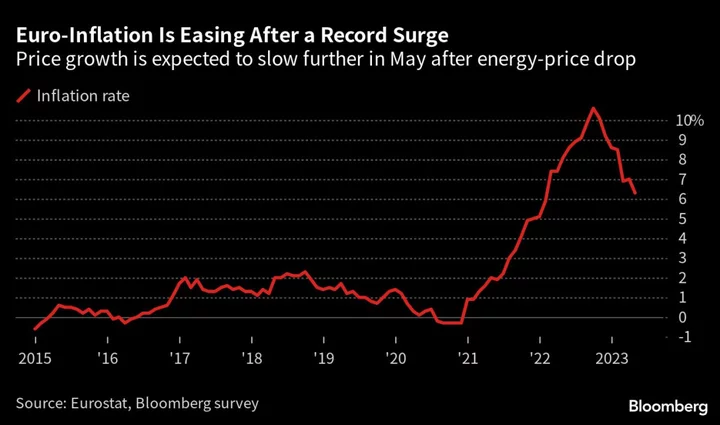European gas prices have plunged to the lowest since mid-2021, when Russia was just beginning to squeeze supplies before its invasion of Ukraine, helping to reverse a surge in inflation and bring relief to consumers.
The slump — gas futures are down by two-thirds already this year – hasn’t just eased the pressure on household budgets. It also undermines one of the biggest bargaining chips held by President Vladimir Putin — the ability to squeeze the region’s gas supplies.
With some traders predicting short-term prices could even go negative at times this summer, the picture couldn’t be more different from May last year. Back then, futures were quadruple what they are now and countries were forced to revive coal generation to keep the lights on after Russia slashed gas supplies.
There were also worries about shortages and whether Europe would be able to build gas storage levels before winter. Now, stockpiles are above average and might even be filled during the summer, and ahead of schedule.
Benchmark Dutch futures have fallen for eight straight weeks and are below €25 per megawatt hour, the lowest since May 2021.
Increased imports of liquefied natural gas to replace Russian supplies have helped, as did a relatively mild winter, which meant the region didn’t need to dip into storage sites too extensively. Reserves are almost 67% full for Europe, compared with a five-year average of about 50%. German stockpiles are at 73%, according to data from Gas Infrastructure Europe.
Economic weakness is also playing a part by curtailing energy consumption. China’s recovery has lost momentum, European manufacturing is in a deep slump and Germany unexpectedly shrank in the first quarter, tipping it into a recession.
Plus Europe has been pushing to build more renewables. New solar and wind farms and good weather conditions have helped reduce the need for gas in power generation this year, easing demand even further.
The drop in prices “is excellent news for Europe and shows that increased LNG imports as well as demand reduction managed to swiftly rebalance the European market after Russia closed the taps,” said Georg Zachmann, a senior fellow at Brussels-based think tank Bruegel.
Read the Big Take on Germany: Europe’s Economic Engine Is Breaking Down
For households, the price benefits are clear to see. Euro-area inflation probably slowed to 6.3% in May, the lowest since just before Russia invaded Ukraine. In the report, due Tuesday, economists at Nomura say they expect to see “lower wholesale energy prices reaching consumers broadly across the euro area.”
But even after central banks hiked interest rates, underlying measures of inflation are proving more sticky. That’s partly because energy costs have radiated out to the price of goods and services in the wider economy. As headline inflation falls back, wage pressure will moderate but that process will take time.
Read More: Euro-Zone Crawl Toward 2% Inflation Keeps ECB in Rate-Hike Mode
For most sectors, the crisis began when Russia invaded Ukraine in February 2022. For energy it began two years ago when Moscow first started squeezing supplies by declining to increase deliveries to Europe via Ukraine. Now, Ukraine is the last remaining route for Russia’s piped gas to western Europe after the shuttered Nord Stream link to Germany was damaged in September.
The market is closely watching gas demand from China. European gas prices could fall even further, below €20 a megawatt-hour, if Chinese LNG imports prove very weak, according to analysts at Energy Aspects.
In Europe itself, the current low prices aren’t triggering an increase in industrial demand, which was cut last year during the surge in energy costs. If and when this will return is one of the biggest questions for gas traders trying to judge where the bottom of the market might be. Some are saying that part of that loss will be permanent.
“Demand destruction is a nice phrase for industry collapse,” said Brenda Shaffer, a senior fellow at the Atlantic Council’s Global Energy Center in Washington. “Due to the high energy prices in Europe, many industries, especially gas intensive ones, either collapsed or moved outside of Europe.”
“Those industries won’t return, even if energy prices come down,” she added.
--With assistance from Stephen Stapczynski and Anna Shiryaevskaya.

